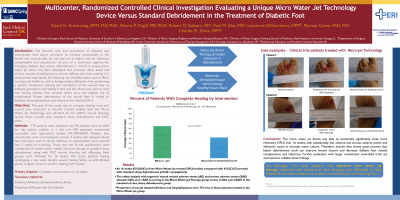Clinical Research
(CR-006) Multi-center, Randomized Controlled Clinical Investigation Evaluating a Unique Micro Water Jet Technology Device Versus Standard Debridement in the Treatment of Diabetic Foot Wounds; 96 patient analysis.

Proper debridement of the wound base is critical to facilitate wound granulation and closure in non-healing diabetic foot ulcers(DFUs). A unique micro water jet device has been developed and recently granted breakthrough designation for treatment of DFUs by the Foot and Drug Administration(FDA) that precisely cleans acute and chronic wounds in a tissue-preserving manner while performing a precise mechanical cleaning and stimulation of the wound base to enhance granulation and healing. In this trial the device was used to treat non healing DFUs.
Methods:
170 patients were screened, and 96 patients were enrolled for the analysis, in a two arm randomized controlled trial. Diabetic foot wounds that were non-healing for at least 4 weeks, with adequate blood flow and were void of clinical infection or osteomyelitis were entered into 2 weeks of screening. Those that met all the qualifications were randomized to receive either weekly micro jet wound treatment or standard sharp debridement along with SOC wound dressing and offloading. Both groups were followed for 16 weeks. The primary study endpoint was healing at 16 weeks and the secondary endpoints included a safety analysis.
Results:
At 16 weeks 65%(28/43) of the Micro Water jet treated DFUs healed compared with 42%(22/53) treated with standard sharp debridement p=0.021 (unadjusted). Furthermore, at 16 weeks, the safety analysis showed with regard to wound related adverse events (AE) and serious adverse events (SAE); 4 AEs and 1 SAE occurring in the Micro Water jet group versus 12 AEs and 4 SAEs in the standard sharp debridement group.
Discussion: The micro water jet device was able to statistically significantly close more refractory DFUs over 16 weeks, without the need for any advanced biologic or graft. Further, the number of wound related infections and hospitalizations were 75% less in those patients treated in the Micro Water jet group. Further evaluation is warranted to validate these initial promising findings

.jpeg)